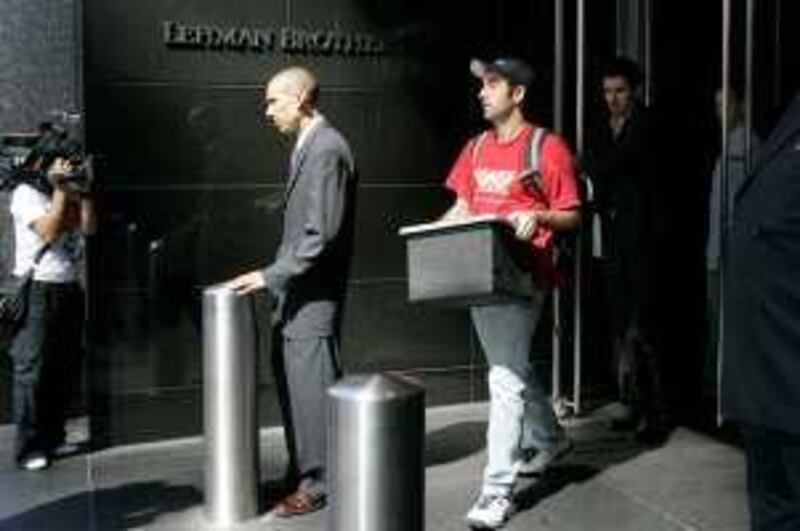Larry McCarthy sat at a table at Lehman Brothers in 2007 and spelt out the dangers that the Wall Street blue chip company was facing. Exposed to mounting subprime mortgage liabilities, the fourth-floor bond trader shocked the executives with three prophetic sentences that would come back to haunt them. "You see that right there?" he pointed hypothetically towards the window. "That's an ? iceberg and we're headed straight for it, flank speed. Even the ? Titanic tried to swerve."
His warning was ignored. Lehman simply carried straight on, at least for another 12 months, before breaking up on September 15 last year after filing for bankruptcy following losses of up to US$5 billion (Dh18.36bn). In the end, the 250-year-old New York investment bank not only hit the iceberg, it ruptured the whole financial system. The aftershocks from Lehman's demise set off tremors throughout Wall Street. Uncertainty surrounding its transactions with banks and hedge funds sparked a crisis of confidence.
In turn, that froze credit lines across the world, forcing governments to step in to try to calm spooked markets. The next 48 hours saw major exchanges sinking in a sea of red. On September 15, the Dow Jones Industrial Average in New York fell 504 points, or 4.4 per cent. It was the biggest one-day drop since September 17, 2001, when the market reopened for trading after the September 11 attacks on the US.
"It was an ugly day," James King, the president and chief investment officer at National Penn Investors Trust, said after the closing bell. "Lehman's failure to find a suitor really stoked the fears of the public. Investor confidence is at the lowest point we've seen in a while." Art Hogan, the chief market strategist for Jefferies, went even further. After witnessing the carnage on the trading room floor, Mr Hogan stressed that the magnitude of the fallout was unprecedented and could only be compared with the Great Depression of the 1930s.
"We've never witnessed this before," he said. "There's no road map for this." Across the Atlantic in Europe, September 15 was renamed "Manic Monday" as the FTSE 100 in London dropped 3.5 per cent and the CAC 40 in Paris fell 3.8 per cent. "The landscape has changed, and a lot of the major players who were are no more, so of course people are panicked," said Stephen Leeb, the president at Leeb Capital Management.
A day later, the crisis deepened when American International Group (AIG) was handed an $85bn lifeline by the US Federal Reserve after filing for bankruptcy. In the previous nine months, AIG had lost $18bn and 91 per cent of its stock value. But unlike Lehman, the biggest insurance company in the US was considered too big to fail, with 74 million clients in 130 countries. "If AIG fails and can't make good on its obligations, forget it," Robert Bolton, the managing director of Mendon Capital Advisers, said at the time. "It's as big a wave as you're going to see."
By the end of the month, that "wave" had washed over global markets, threatening to submerge the financial system, before subsiding. A year later, the haemorrhaging has stopped but the slow drip of rising unemployment has seen the Credit Crunch morph into the Great Recession, with a worldwide recovery still beyond the horizon. For Lehman Brothers, that day will never come. Perhaps Paul Samuelson, the famed American economist and Nobel Prize winner, captured that mood of Black September the best when he said: "What we know about the global financial crisis is that we don't know very much."
* with agencies





